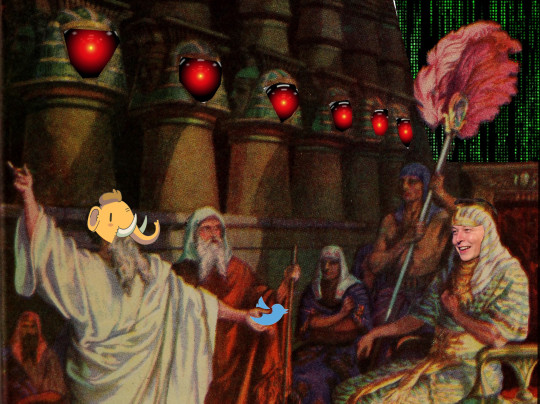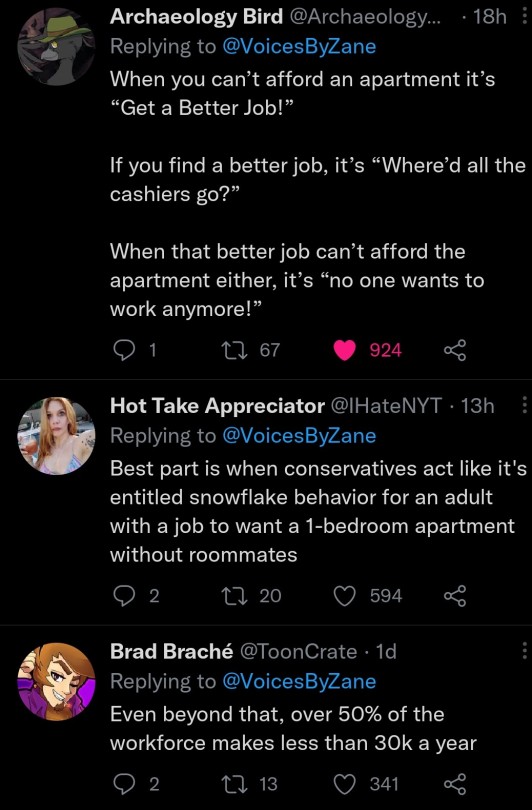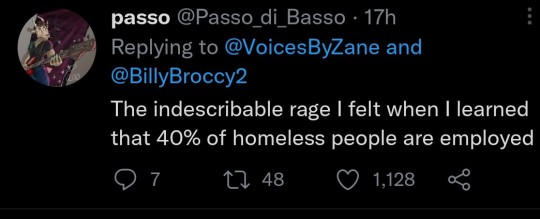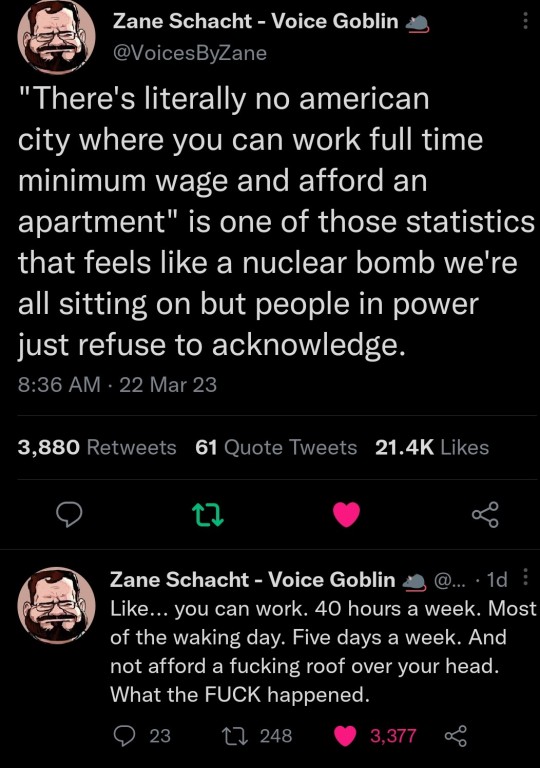Photo

If you see this on your dashboard, reblog this, NO MATTER WHAT and all your dreams and wishes will come true.
155K notes
·
View notes
Text
Fantasy Vs Sexuality Labels
"They don't even have words for it because it is so common and normal that people simply exist." This sentiment is a frequent trope of fictional worlds in reference to queer people's existence. Today, I would like to challenge the idea that people wouldn't have labels even in a "Perfect Non Binary Bisexual Utopia" and unpack everything involved in these conversations.

What Is Homophobia/Transphobia
I know this sounds obvious but I want to explain it beyond like, the obvious part of it. We're skipping past the bigots with guns stuff because that is not all that this kind of bigotry is. If we live in a society that expects you to reproduce that in itself is a form of homophobia. Yes with a trans partner you can have a same gender bio baby but that is if their treatments don't stop them from having babies and also it be a transphobic ask of trans people to be the reporductive labor force for all cis gays.
If society still assigns people genders and has gendered expectations then we also have a form of transphobia even if you remove gendered expectation what are the barriers to transition social and physical and do you need to transition to be seen as valid? Do queer couples exist as a prominent feature of the world not a rare side show? Do women still have some degree of expected submission and do men have some kind of expected dominance?
Homophobia and Transphobia are baked into the way we think about things in the world. People assign kids gender, gender clothing, accessories, manners of setting, etc, etc. And these genderings are tied to the idea of a future partner. Even subverting these genderings often makes one assume something about their sexuality and not just their taste. Subverting heterosexuality or cisgender status is rarely unchallenged even when it's not a violent bigot.
Transphobia and Homophobia are parts of the system, parts that assume all men want to leer over women, that all women want a strong man, that all men should aspire to one of a few roles and the same to women, that non binary people simply do not exist or are some light version of one of the two binary options. It isn't just like yelling the F slur or doing a terrible thing to a queer person.
Let's say we have a princess, there is no bigotry in the world but she is a lesbian, the waring kingdom only has one child a son and to end the war a political marriage is arranged. That is still homophobia even if otherwise the parents would have totally respected the sexuality of the princess. That's just one small sample but we're gonna go into the systems of power and why queerness doesn't even really work like this example, right now, below the keep reading thing.

Why Does Homophobia and Transphobia Exist
Transphobia and homophobia are systems of control. The people with power must create roles for people and they must maintain that power. The creation of strict binary gender and heterosexuality as a standard were both systems of control of people.
Gender denoted an ownership class and the owned class. He Yin Zhen has proposed the creation of ownership of women came from war where men would take women as prizes and with the women at home simply accepting it eventually it bleed to effect them when women began prizes to be won in war rather then part of the society. This bleed into many societies, mutated, changed and we gained the patriarchy as it stands now. The fascists advocating against queer people are almost always looking for a time where "women were women and men were men" aka men were the owners and women were the owned class.
A system of hiarchay needs strange ways to justify itself. For the rich to keep getting smaller and smaller they need systems that explain their wealth and they also need people to serve them. This need for people to serve them leads to anti queer politics, they want a reproductive class even other men must be part of this class who are poor to create servants for the rich.
Transness acts in defiance of all these structures by inherently challenging the gendered power of control. If someone is cast a role and can change it then it becomes a lot harder to justify oppression based on their gender. Property can't decide things for itself and therefore trans men aren't exist to them and to chose to become a property class removes the fake superiority they created.
What Does It Say To Have A World Without Bigotry But Still Has Oppression
So given all of the above, when we make a world without bigotry we are talking about a Utopia. We'll talk more about Utopia's in a bit but right now let's focus on the reality that most these stories that describe themselves as being a world without labels are worlds with strict hierarchy, class based oppression, etc, etc.
When these things happen we start to create myths about how the systems of power can be better. It presents a reformist view inherently and ignores the way these governments use their heels to oppress it's people. It also removes the fact we have interconnected struggles, that oppression against one of us is oppression against all of us. It also ignores that fact that even if the only oppression is class in the world that in the real world the poorest people are typically queer folks of color. We start to whitewash oppression by pretending a black trans lesbian being the oppressor of poor white people is something progressive or something.
Instead it's just conservative propaganda, it's the meritocracy, that no matter who we are we can be anything and is it possible for someone to make it to role of chief oppressor in theory, sure but in practice it is highly rare.
This is only made worse when queerness or queer coding is actively assigned to like terrible fascist governments pretending that a government who killed people for X trait like magic would be cool with gay people. It starts to paint the picture of the evil queer elite pulling the strings, the full fascist make believe fantasy.
Utopian Call For Labels
Now let's say your writing a chill story set in an actual utopia, capitalism has been destroyed, reparations have been made, we've removed the systems of oppression and we live in this lovely world. Then we would still have the history, the labels people have used and the words people have used. What kind of people do you like dating and then everyone has no preference simply would not happen. People will have taste and it is easier to use a general term, maybe one that is historically used to describe the taste you have in romance.
If we lived in a world that never had bigotry, never had bad things happening, people have still used labels. If we look at indigenous cultures across the world many which hard multiple genders had explicitly used labels for those genders, why if people wouldn't naturally label themselves? There is a use for being able to say "i am a person who needs this kind of medical care so my body can look the way I want it to look", there is a use to be able to say "I don't date men", or whatever else without having to say that every time.
Labels are a very useful thing we have as humans. We can say fun very specific things and much broader general things. It is nice to be able to say I am A Fire Emblem fan but also more so an Edelgard fan and that says something about me and to a similar extent saying I am a lesbian but more particularly a trans asexual lesbian is a nice way at a glace of painting a picture for someone even if my experience will not be the same as others.
Labels also allow us to find community with one another. Outside of having to explain to people things, the very idea of having a name for a group allows that group to find one another then share with each other. It is nice to be able to go to a lesbian event and meet other lesbians. It's nice to go to a trans event and be able to talk to other trans people. Even in a utopian world without the words it would be hard to share like innovation in HRT with each other if we didn't know who to communicate that with.
Conclusion
This isn't saying that I want stories to focus around homophobia, I don't, I actually much prefer happy queer stories then sad ones. What I am saying is that we don't need our worlds to be unrealistic to be happy and we don't need to strip ourselves of our labels to be progressive. There is no reason for people not to say they are a Lesbian, Bisexual, Gay, Queer, etc, etc, etc in fiction or some made up word or some word from some other language that means a similar thing.
Regardless of the tone of our story we can realize that we live in the real world where people live with their actual sexualities and being represented matters to them so having a bisexual character say they are bisexual and a lesbian character say they are a lesbian matters. Trans people saying they are trans matters. We can do representation that is explicit, clear and focused. Doing that also makes it easier to tell the messier queer stories of people who aren't sure of their sexuality, that's sexuality and gender shifts, that don't line up perfectly with their labels. When we start to define things we can actually talk about them and be critical of them and engage with them in real ways.
I don't think treating our words like a dirty little secret is what we should be striving for as a utopian ideal, I want a world where people are happily openly lesbians, gay, bi, trans, asexual, bigender, non binary, etc.
Not to mention very often this kind of "we don't use labels" really exists to just say queer subtext is canon to people who are queer and just playful for straight audiences. It is a way to avoid defining a queer politics or angering people. It is not real representation most often it is not done in good faith but for a company to play it safe.
21 notes
·
View notes
Text
the way these strikes get framed is always so funny to me
"the strike could stretch on until the end of summer" or the execs could pay their workers
"there won't be ANY new shows because of this strike" or the execs could pay their workers
"no more content for us because the mean old writers and actors are-" OR THE EXECS COULD PAY THEIR WORKERS
67K notes
·
View notes
Text
Please Reblog is Your Blog is Safe for Non-Binary People.
If my mutuals can’t rb this then we can’t be mutuals
327K notes
·
View notes
Text
this is so so important to me and mine, and I'm asking you to Do Something so I'll respect your time and keep it brief

in the UK, if 100k sign a a government petition it will be brought to Parliament and debated. y'all know this country is suffering from some 80s-style bigotry right now, and this is one symptom: almost 200k fuckholes have come together to force the government to discuss whether it is 'appropriate' to tell children that queer people exist. this is a big symbolic victory for them. and i am burning with fury.
please, if you're from the UK, sign this counter-petition so they can at least see how much of a minority they are. simply put, the attempt to put these bastards in their place isn't gathering enough steam. there are barely 2000 more signatures now than there were this morning (27th January 2023), and that isn't enough. i refuse to let these people feel even a moment of victory or satisfaction. please help.
65K notes
·
View notes
Text
I'm so tired of cis people asking stuff like, "Why would Texas want a lisf of trans people who legally changed their names?" or "Why would Florida want a list of college students who have seeking gender affirming care? We can't figure it out."
It's eliminationist.
Ken Paxton wants a list of trans people who have changed their name in Texas so he can reverse all of those decisions (and that's the most charitable interpretation). Ron DeSantis wants a list of college students who have seemed affirming care so he can force them to detransition.
Oklahoma introduced a bill to forcibly detransition people under the age of 21 (ironically doing what they accuse us of doing, forcing someone to live as the wrong gender). Texas has a new bill that will ban gender affirming care for every Texan of any age and makes it a felony for doctors to provide it. Multiple states either have passed or will pass bills that will ban legal name changes. Some states have slipped in language to anti-drag bills (which are horrific enough on their own) that ban anyone from displaying, presenting, or dressing outside their "biological" gender (one state has language about "DNA gender") in public.
It's about legally and morally mandating trans people out of existence.
Plain and simple. It's about making sure that trans people can not exist. Period. It's not about restrictions, or "think of the children!" It's about eliminating us from public life and then eliminating us from private life so that we have a choice of either die or conform.
When will y'all realize this isn't some wedge issue or a political football that they'll just give up on if they lose an election or two. These are ideologues who are singularly focused. They don't care about the marketplace of ideas. They don't give a shit if they get mocked on lefty Twitter and the late night shows. They only care about one thing: gaining and then wielding power to achieve their goal of eliminating trans people (and then gay people, and then women who don't conform to their gender standards, ect).
If you give them that power they will use it.
35K notes
·
View notes
Text
Better failure for social media

Content moderation is fundamentally about making social media work better, but there are two other considerations that determine how social media fails: end-to-end (E2E), and freedom of exit. These are much neglected, and that’s a pity, because how a system fails is every bit as important as how it works.
Of course, commercial social media sites don’t want to be good, they want to be profitable. The unique dynamics of social media allow the companies to uncouple quality from profit, and more’s the pity.
Social media grows thanks to network effects — you join Twitter to hang out with the people who are there, and then other people join to hang out with you. The more users Twitter accumulates, the more users it can accumulate. But social media sites stay big thanks to high switching costs: the more you have to give up to leave a social media site, the harder it is to go:
https://www.eff.org/deeplinks/2021/08/facebooks-secret-war-switching-costs
Nature bequeaths some in-built switching costs on social media, primarily the coordination problem of reaching consensus on where you and the people in your community should go next. The more friends you share a social media platform with, the higher these costs are. If you’ve ever tried to get ten friends to agree on where to go for dinner, you know how this works. Now imagine trying to get all your friends to agree on where to go for dinner, for the rest of their lives!
But these costs aren’t insurmountable. Network effects, after all, are a double-edged sword. Some users are above-average draws for others, and if a critical mass of these important nodes in the network map depart for a new service — like, say, Mastodon — that service becomes the presumptive successor to the existing giants.
When that happens — when Mastodon becomes “the place we’ll all go when Twitter finally becomes unbearable” — the downsides of network effects kick in and the double-edged sword begins to carve away at a service’s user-base. It’s one thing to argue about which restaurant we should go to tonight, it’s another to ask whether we should join our friends at the new restaurant where they’re already eating.
Social media sites who want to keep their users’ business walk a fine line: they can simply treat those users well, showing them the things they ask to see, not spying on them, paying to police their service to reduce harassment, etc. But these are costly choices: if you show users the things they ask to see, you can’t charge businesses to show them things they don’t want to see. If you don’t spy on users, you can’t sell targeting services to people who want to force them to look at things they’re uninterested in. Every moderator you pay to reduce harassment draws a salary at the expense of your shareholders, and every catastrophe that moderator prevents is a catastrophe you can’t turn into monetizable attention as gawking users flock to it.
So social media sites are always trying to optimize their mistreatment of users, mistreating them (and thus profiting from them) right up to the point where they are ready to switch, but without actually pushing them over the edge.
One way to keep dissatisfied users from leaving is by extracting a penalty from them for their disloyalty. You can lock in their data, their social relationships, or, if they’re “creators” (and disproportionately likely to be key network nodes whose defection to a rival triggers mass departures from their fans), you can take their audiences hostage.
The dominant social media firms all practice a low-grade, tacit form of hostage-taking. Facebook downranks content that links to other sites on the internet. Instagram prohibits links in posts, limiting creators to “Links in bio.” Tiktok doesn’t even allow links. All of this serves as a brake on high-follower users who seek to migrate their audiences to better platforms.
But these strategies are unstable. When a platform becomes worse for users (say, because it mandates nonconsensual surveillance and ramps up advertising), they may actively seek out other places on which to follow each other, and the creators they enjoy. When a rival platform emerges as the presumptive successor to an incumbent, users no longer face the friction of knowing which rival they should resettle to.
When platforms’ enshittification strategies overshoot this way, users flee in droves, and then it’s time for the desperate platform managers to abandon the pretense of providing a public square. Yesterday, Elon Musk’s Twitter rolled out a policy prohibiting users from posting links to rival platforms:
https://web.archive.org/web/20221218173806/https://help.twitter.com/en/rules-and-policies/social-platforms-policy
This policy was explicitly aimed at preventing users from telling each other where they could be found after they leave Twitter:
https://web.archive.org/web/20221219015355/https://twitter.com/TwitterSupport/status/1604531261791522817
This, in turn, was a response to many users posting regular messages explaining why they were leaving Twitter and how they could be found on other platforms. In particular, Twitter management was concerned with departures by high-follower users like Taylor Lorenz, who was retroactively punished for violating the policy, though it didn’t exist when she violated it:
https://deadline.com/2022/12/washington-post-journalist-taylor-lorenz-suspended-twitter-1235202034/
As Elon Musk wrote last spring: “The acid test for two competing socioeconomic systems is which side needs to build a wall to keep people from escaping? That’s the bad one!”
https://twitter.com/elonmusk/status/1533616384747442176
This isn’t particularly insightful. It’s obvious that any system that requires high walls and punishments to stay in business isn’t serving its users, whose presence is attributable to coercion, not fulfillment. Of course, the people who operate these systems have all manner of rationalizations for them.
The Berlin Wall, we were told, wasn’t there to keep East Germans in — rather, it was there to keep the teeming hordes clamoring to live in the workers’ paradise out. In the same way, platforms will claim that they’re not blocking outlinks or sideloading because they want to prevent users from defecting to a competitor, but rather, to protect those users from external threats.
This rationalization quickly wears thin, and then new ones step in. For example, you might claim that telling your friends that you’re leaving and asking them to meet you elsewhere is like “giv[ing] a talk for a corporation [and] promot[ing] other corporations”:
https://mobile.twitter.com/mayemusk/status/1604550452447690752
Or you might claim that it’s like “running Wendy’s ads [on] McDonalds property,” rather than turning to your friends and saying, “The food at McDonalds sucks, let’s go eat at Wendy’s instead”:
https://twitter.com/doctorow/status/1604559316237037568
The truth is that any service that won’t let you leave isn’t in the business of serving you, it’s in the business of harming you. The only reason to build a wall around your service — to impose any switching costs on users- is so that you can fuck them over without risking their departure.
The platforms want to be Anatevka, and we the villagers of Fiddler On the Roof, stuck plodding the muddy, Cossack-haunted roads by the threat of losing all our friends if we try to leave:
https://doctorow.medium.com/how-to-leave-dying-social-media-platforms-9fc550fe5abf
That’s where freedom of exit comes in. The public should have the right to leave, and companies should not be permitted to make that departure burdensome. Any burdens we permit companies to impose is an invitation to abuse of their users.
This is why governments are handing down new interoperability mandates: the EU’s Digital Markets Act forces the largest companies to offer APIs so that smaller rivals can plug into them and let users walkaway from Big Tech into new kinds of platforms — small businesses, co-ops, nonprofits, hobby sites — that treat them better. These small players are overwhelmingly part of the fediverse: the federated social media sites that allow users to connect to one another irrespective of which server or service they use.
The creators of these platforms have pledged themselves to freedom of exit. Mastodon ships with a “Move Followers” and “Move Following” feature that lets you quit one server and set up shop on another, without losing any of the accounts you follow or the accounts that follow you:
https://codingitwrong.com/2022/10/10/migrating-a-mastodon-account.html
This feature is as yet obscure, because the exodus to Mastodon is still young. Users who flocked to servers without knowing much about their managers have, by and large, not yet run into problems with the site operators. The early trickle of horror stories about petty authoritarianism from Mastodon sysops conspicuously fail to mention that if the management of a particular instance turns tyrant, you can click two links, export your whole social graph, sign up for a rival, click two more links and be back at it.
This feature will become more prominent, because there is nothing about running a Mastodon server that means that you are good at running a Mastodon server. Elon Musk isn’t an evil genius — he’s an ordinary mediocrity who lucked into a lot of power and very little accountability. Some Mastodon operators will have Musk-like tendencies that they will unleash on their users, and the difference will be that those users can click two links and move elsewhere. Bye-eee!
Freedom of exit isn’t just a matter of the human right of movement, it’s also a labor issue. Online creators constitute a serious draw for social media services. All things being equal, these services would rather coerce creators’ participation — by holding their audiences hostage — than persuade creators to remain by offering them an honest chance to ply their trade.
Platforms have a variety of strategies for chaining creators to their services: in addition to making it harder for creators to coordinate with their audiences in a mass departure, platforms can use DRM, as Audible does, to prevent creators’ customers from moving the media they purchase to a rival’s app or player.
Then there’s “freedom of reach”: platforms routinely and deceptively conflate recommending a creator’s work with showing that creator’s work to the people who explicitly asked to see it.
https://pluralistic.net/2022/12/10/e2e/#the-censors-pen
When you follow or subscribe to a feed, that is not a “signal” to be mixed into the recommendation system. It’s an order: “Show me this.” Not “Show me things like this.”
Show.
Me.
This.
But there’s no money in showing people the things they tell you they want to see. If Amazon showed shoppers the products they searched for, they couldn’t earn $31b/year on an “ad business” that fills the first six screens of results with rival products who’ve paid to be displayed over the product you’re seeking:
https://pluralistic.net/2022/11/28/enshittification/#relentless-payola
If Spotify played you the albums you searched for, it couldn’t redirect you to playlists artists have to shell out payola to be included on:
https://pluralistic.net/2022/09/12/streaming-doesnt-pay/#stunt-publishing
And if you only see what you ask for, then product managers whose KPI is whether they entice you to “discover” something else won’t get a bonus every time you fatfinger a part of your screen that navigates you away from the thing you specifically requested:
https://doctorow.medium.com/the-fatfinger-economy-7c7b3b54925c
Musk, meanwhile, has announced that you won’t see messages from the people you follow unless they pay for Twitter Blue:
https://www.wired.com/story/what-is-twitter-blue/
And also that you will be nonconsensually opted into seeing more “recommended” content from people you don’t follow (but who can be extorted out of payola for the privilege):
https://www.socialmediatoday.com/news/Twitter-Expands-Content-Recommendations/637697/
Musk sees Twitter as a publisher, not a social media site:
https://twitter.com/elonmusk/status/1604588904828600320
Which is why he’s so indifferent to the collateral damage from this payola/hostage scam. Yes, Twitter is a place where famous and semi-famous people talk to their audiences, but it is primarily a place where those audiences talk to each other — that is, a public square.
This is the Facebook death-spiral: charging to people to follow to reach you, and burying the things they say in a torrent of payola-funded spam. It’s the vision of someone who thinks of other people as things to use — to pump up your share price or market your goods to — not worthy of consideration.
As Terry Pratchett’s Granny Weatherwax put it: “Sin is when you treat people like things. Including yourself. That’s what sin is.”
Mastodon isn’t perfect, but its flaws are neither fatal nor permanent. The idea that centralized media is “easier” surely reflects the hundreds of billions of dollars that have been pumped into refining social media Roach Motels (“users check in, but they don’t check out”).
Until a comparable sum has been spent refining decentralized, federated services, any claims about the impossibility of making the fediverse work for mass audiences should be treated as unfalsifiable, motivated reasoning.
Meanwhile, Mastodon has gotten two things right that no other social media giant has even seriously attempted:
I. If you follow someone on Mastodon, you’ll see everything they post; and
II. If you leave a Mastodon server, you can take both your followers and the people you follow with you.
The most common criticism of Mastodon is that you must rely on individual moderators who may be underresourced, incompetent on malicious. This is indeed a serious problem, but it isn’t the same serious problem that Twitter has. When Twitter is incompetent, malicious, or underresourced, your departure comes at a dear price.
On Mastodon, your choice is: tolerate bad moderation, or click two links and move somewhere else.
On Twitter, your choice is: tolerate moderation, or lose contact with all the people you care about and all the people who care about you.
The interoperability mandates in the Digital Markets Act (and in the US ACCESS Act, which seems unlikely to get a vote in this session of Congress) only force the largest platforms to open up, but Mastodon shows us the utility of interop for smaller services, too.
There are lots of domains in which “dominance” shouldn’t be the sole criteria for whether you are expected to treat your customers fairly.
A doctor with a small practice who leaks all ten patients’ data harms those patients as surely as a hospital system with a million patients would have. A small-time wedding photographer who refuses to turn over your pictures unless you pay a surprise bill is every bit as harmful to you as a giant chain that has the same practice.
As we move into the realm of smalltime, community-oriented social media servers, we should be looking to avoid the pitfalls of the social media bubble that’s bursting around us. No matter what the size of the service, let’s ensure that it lets us leave, and respects the end-to-end principle, that any two people who want to talk to each other should be allowed to do so, without interference from the people who operate their communications infrastructure.
Image:
Cryteria (modified)
https://commons.wikimedia.org/wiki/File:HAL9000.svg
CC BY 3.0
https://creativecommons.org/licenses/by/3.0/deed.en
Heisenberg Media (modified)
https://commons.wikimedia.org/wiki/File:Elon_Musk_-_The_Summit_2013.jpg
CC BY 2.0
https://creativecommons.org/licenses/by/2.0/deed.en
[Image ID: Moses confronting the Pharaoh, demanding that he release the Hebrews. Pharaoh’s face has been replaced with Elon Musk’s. Moses holds a Twitter logo in his outstretched hand. The faces embossed in the columns of Pharaoh’s audience hall have been replaced with the menacing red eye of HAL9000 from 2001: A Space Odyssey. The wall over Pharaoh’s head has been replaced with a Matrix ‘code waterfall’ effect. Moses’s head has been replaced with that of the Mastodon mascot.]
3K notes
·
View notes
Photo

Currently living on little savings I have, just little projects here and there, now hoping to get a full-time job after Christmas but in the meantime, rent has to be paid and I could use your help.
If you like the content and you are able please consider
paypal.me/heroesincolor
3K notes
·
View notes
Photo

Currently living on little savings I have, just little projects here and there, now hoping to get a full-time job after Christmas but in the meantime, rent has to be paid and I could use your help.
If you like the content and you are able please consider
paypal.me/heroesincolor
3K notes
·
View notes
Text
Need an IMDb replacement too.
did you know that the fediverse has more than just a microblogging replacement? And that they can all interoperate with your Mastodon account?
Check them out!
Facebook replacement: Friendica
Instagram replacement: Pixelfed
YouTube replacement: PeerTube
Spotify replacement: Funkwhale
MeetUp replacement: Mobilizon
Reddit replacement: Lemmy
Podcasting replacement: Castopod
GoodReads replacement: BookWyrm
36 notes
·
View notes
Text
Glad to see ranked choice voting have a good Election Day.
2 notes
·
View notes
Text
I don’t think I’ve posted a full post here before, and I’ve had this (and another account) for a few years. But I guess I can do an introduction?
Hi! Im 35, Black, queer, atheist, web designer by profession (primarily Wordpress), social Democratic/green, spent a lot of time doing political work (paid and unpaid), and am currently working in fast food. COVID-related blood clots nearly killed me once, but I got better. Might be on the spectrum?
Want desperately to move out of the Southern U.S., preferably to a state with Medicaid expansion, legal cannabis, and ballot initiatives. Don’t want to own a car, would like to bike in a walkable/bikeable neighborhood if possible.
Want to see the YIMBY and PHIMBY movements succeed in reducing the cost of housing, RCV (or party list) proportional representation become a feature of legislatures, cash bail and felony disenfranchisement ended, gerrymandering made obsolete, and stuff like that.
TBH I’m more of a Facebook person, but I want to ditch both that and Twitter for both Mastodon/Fediverse and here. So, here we go.
0 notes





